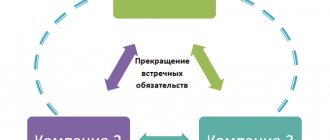Interdependent persons for purposes of tax legal relations in 2020 according to the Tax Code of the Russian Federation are...
For tax purposes, the Russian legislator defines 2 or more subjects of legal relations as interdependent persons, each of which can influence the conclusion of transactions by another or other subjects, as well as the economic results of activities carried out by another or other subjects (Clause 1, Article 105.1 of the Tax Code of the Russian Federation).
In accordance with paragraph 2 of Art. 105.1 of the Tax Code of the Russian Federation, interdependent persons for tax purposes are:
- 2 legal entities, if one owns at least 25% of the capital of the other;
- an individual and a legal entity, if the individual owns more than 25% of the capital of the legal entity;
- 2 or more legal entities, if the same individual owns more than 25% of the capital in each of the relevant legal entities;
- an individual and a legal entity, if the individual has the authority to appoint a director or at least 50% of the management team of the legal entity;
- 2 or more legal entities that have directors (at least 50% of the management) appointed by the same individual;
- 2 or more legal entities with a board of directors formed by 50% or more of the same individuals;
- legal entity and individual, if the individual is the director of the legal entity;
- 2 or more legal entities in which the director is the same individual;
- 3 or more legal entities, if the first owns at least 50% of the capital of the second, while the second owns at least 50% of the capital of the third (which, in turn, can own at least 50% of the capital of the 4th, and further on similar scheme);
- an individual, as well as two or more legal entities, if the individual owns at least 50% of the capital of the first legal entity, which owns at least 50% of the capital of the second legal entity (which, in turn, may own at least 50% of the capital of the 3rd, and further according to a similar scheme);
- 2 individuals, if one, by virtue of official position, is subordinate to the other;
- close relatives - spouses, children and parents, brothers and sisters, guardians and wards.
The share of close relatives in the ownership of the capital of the same legal entity is summed up, and if it reaches the values indicated in the list above, then all of them are considered as subjects of interdependent transactions (clause 3 of Article 105.1 of the Tax Code of the Russian Federation).
Mutual dependence of persons can be established in separate agreements between them or in another way that predetermines the influence of one person on another (Clause 1 of Article 105.1 of the Tax Code of the Russian Federation).
Find out how tax authorities prove a scheme for splitting a business for the purpose of unjustified tax benefits, if the founders are interdependent persons, in ConsultantPlus. Get trial access to the system and start learning the material for free.
Concept of interdependent persons
Article 20 of the Tax Code of the Russian Federation introduced a new concept of “interdependent persons” used for tax purposes.
At the same time, Russian legislation already knows largely similar concepts of associated and affiliated persons.
Associated persons in Double Tax Treaties are defined as persons who directly or indirectly participate in the management, control or capital of another enterprise.
The concept of affiliates is contained in a number of regulatory legal acts, including the following:
- Law of the Russian Federation of March 22, 1991 No. 948-1 “On competition and restrictions on monopolistic activities in product markets”;
- Order of the State Property Committee of Russia dated 04/05/1994 No. 723-r.
Affiliated persons are individuals and legal entities capable of influencing the activities of legal entities and (or) individuals engaged in business activities (Article 4 of the Law of the Russian Federation of March 22, 1991 No. 948-1).
So, speaking about interdependent persons for tax purposes, it should be noted that the legislator in paragraph 1 of Article 20 of the Tax Code of the Russian Federation established a number of criteria, in the presence of which organizations and (or) individuals are unconditionally recognized as interdependent. These signs include the following:
A. Direct and (or) indirect participation of one organization in another organization, if the total share of such participation is more than 20 percent (it would be more correct to speak not about the share of participation in another organization, but about the share of participation in the authorized (share) capital of another organization) .
This situation can arise in three cases:
1. Direct participation only.
For example, an organization has more than twenty percent of the voting shares of a joint stock company or twenty percent of the authorized capital of a limited liability company (i.e., a dominant and dependent business company according to Article 106 of the Civil Code of the Russian Federation).
2. Mixed (direct and indirect) participation.
For example, the share of direct participation of organization A in organization B is less than 20 percent, but organization A participates in organization B through organization C (indirect participation) and the total share of participation exceeds 20 percent.
In this case, the share of direct (direct) participation of organization A in organization B is 10 percent, the share of indirect participation is 15 percent (50% x 30%). In total, the share of participation of organization A in organization B is 25 percent (10% + 15%) and, therefore, for tax purposes these organizations will be interdependent.
3. Only indirect participation.
In the absence of direct participation, to determine the degree of influence of one organization on another, it is necessary to multiply the shares of direct participation of these organizations.
For example, organization A does not directly participate in organization C, but its share of indirect participation is 27% (50% x 60% x ..50% + 40% x 30%), therefore organizations A and C will be interdependent for tax purposes.
B. One individual is subordinate to another individual due to his official position.
Based on the meaning of this norm, it follows that we are talking about individuals who are in labor relations regulated by the Labor Code of the Russian Federation (hereinafter referred to as the Labor Code of the Russian Federation), since we are talking about an official
position
Please note that the title of the position is one of the essential terms of the employment contract. In the main document on labor activity - the work book (Article 66 of the Labor Code of the Russian Federation) - an entry is made about the name of the position for which the employee is hired.
B. Persons are, in accordance with the family legislation of the Russian Federation, in marital relations, relations of kinship or property, adoptive parent and adopted child, trustee and ward.
In the Russian Federation, marriage relations are regulated, in particular, by the Family Code of the Russian Federation (hereinafter referred to as the RF IC).
Since the legislator recognizes as interdependent persons who are in a marital relationship in accordance with the family legislation of the Russian Federation (subparagraph 3 of paragraph 1 of Article 20 of the Tax Code of the Russian Federation), then for tax purposes, taking into account paragraph 2 of Article 1 of the RF IC, a marriage concluded only in the civil registry office is recognized . In this regard, we can conclude that persons who are in a marital relationship without legal registration will not be interdependent in the sense of the norm contained in subparagraph 3 of paragraph 1 of Article 20 of the Tax Code of the Russian Federation.
At the same time, relations of property (relations of intimacy between people arising not by kinship, but from a marriage union, including relations between a spouse and blood relatives of the other spouse, as well as between relatives of spouses) cannot be considered as such due to the lack of registration of marriage relations in accordance with with the law.
It should be noted that the Family Code of the Russian Federation, mentioning only close relatives in Article 14, does not disclose kinship relationships. At the same time, taking into account the norm of Article 4 of the RF IC, the relationship of kinship can be disclosed by the norms of civil legislation.
So, in accordance with Article 14 of the RF IC, close relatives are:
- relatives in a direct ascending and descending line - parents, grandparents, children, grandchildren;
- full and half (having a common father or mother) brothers and sisters.
In accordance with paragraph 1 of Article 1145 of the Civil Code of the Russian Federation, the degree of relationship is determined by the number of births separating relatives of one from another.
Taking into account Articles 1142 - 1145 of the Civil Code of the Russian Federation, relatives in relation to a certain individual will be parents, grandparents (both on the father's and mother's sides), as well as great-grandfathers and great-grandmothers, children, grandchildren, full and half brothers and sisters , full and half brothers and sisters of parents (uncles and aunts), children of full and half brothers and sisters (nephews and nieces), cousins, children of nephews and nieces (great-grandsons and granddaughters), brothers and sisters of grandfathers and grandmothers (great-uncles and grandmothers), children of cousins' grandchildren and granddaughters (great-great-grandsons and great-granddaughters), children of cousins (great-nephews and nieces), children of great-uncles and grandmothers (great-uncles and aunts).
In addition, an individual may be in property with the spouse’s parents (father-in-law, mother-in-law, father-in-law, mother-in-law), stepfather, stepmother, stepson, stepdaughter, as well as with persons of another degree of property.
It should be taken into account that on the territory of the Russian Federation, the All-Russian Classifier of Population Information OK 018-95 (OKIN), which contains information about kinship and property, was adopted and put into effect by Decree of the State Standard of Russia dated July 31, 1995 No. 412.
Speaking about the relations between the adoptive parent and the adopted child, the trustee and the ward, we only note that these relations are regulated, in particular, by the norms of chapters 19 and 20 of the RF IC, as well as articles 31 - 40 of the RF Civil Code.
So, for none of the three reasons listed above, an organization and an individual, including a joint-stock company and its shareholders - individuals, cannot be interdependent persons in relation to each other.
The same applies to organizations connected to each other through an individual (founder, general director).
At the same time, the court may recognize persons as interdependent on other grounds, but it can do this only if the relationships that have developed between such persons may affect the results of transactions for the sale of goods (works, services). This rule is enshrined in paragraph 2 of Article 20 of the Tax Code of the Russian Federation.
In addition to the exhaustive list of criteria established by paragraph 1 of Article 20 of the Tax Code of the Russian Federation, a court decision recognizing persons as interdependent on other grounds may become a reason for additional tax assessment.
Related parties and tax law of the Russian Federation
Among financial and legal terms, the concept of “related parties” is often used. This term is somewhat similar to the concept of “related parties”, but it is not used in tax law.
Related entities are entities that meet at least one of the following characteristics:
- 1 person directly (indirectly) controls the other;
- one or more employees work in several organizations, for example, the director in the 1st and 2nd company is the same person;
- several legal entities are bound by contractual legal relations and work together to generate profit, including expenses and losses;
- employee and employer;
- 2 companies are controlled by a third party;
- 2 persons directly or indirectly control a third party;
- persons are relatives or members of the same family.
The concept of interconnectedness of persons is given in Art. 37 of Appendix 1 to the Customs Code of the Eurasian Economic Union. One of the criteria that predetermines the occurrence of corresponding consequences is the controllability of transactions involving interdependent persons. Let's study this aspect in more detail.
What's the result?
Interdependence is by no means the same as delinquency.
As evidence, it is never used by the tax authorities “alone”, but always only in conjunction with other facts. Therefore, avoiding interdependence where it is difficult to do so does not make sense.
Consolidating real participation in business is impossible without the emergence of interdependence between individuals. If a business organization model does not have an artificial, far-fetched content, but a real one, and reflects the current state of affairs in terms of the distribution of areas of responsibility, commodity flows, etc., it will be very difficult and problematic for the tax authority to prove the intention to obtain an unjustified tax benefit and its real size.
The relationship between mutual dependence and controllability in tax law: nuances
So, a transaction involving interdependent entities may have legal consequences if it is recognized as controlled. This will mean that the Federal Tax Service will pay close attention to it and study it for unreasonable understatement or overestimation of amounts transferred from one entity to another. Deviations in transaction prices between related parties can be used:
- to understate the tax base in order to reduce tax amounts;
- overstatement of the tax base for the purpose of calculating a larger deduction.
By controlling the transaction, the Federal Tax Service has the right to ensure the correctness of tax calculations:
- at a profit;
- Personal income tax (for individual entrepreneurs);
- MET;
- VAT.
How transactions between related parties take place can be found here.
The criteria for recognizing transactions as controlled are specified in Art. 105.14 Tax Code of the Russian Federation.
You can view these criteria here.
In turn, in paragraph 4 of Art. 105.14 of the Tax Code of the Russian Federation contains criteria for non-recognition of transactions as controlled. It is useful to pay attention to the letter of the Federal Tax Service dated November 2, 2012 No. ED-4-3/18615. In it, the department warns taxpayers that it will:
- control any transactions of interdependent persons that give rise to talk about the establishment of non-market prices in contracts for the purpose of tax evasion;
- Conduct desk audits using methods for identifying unjustified tax benefits of the payer in accordance with the norms of Chapter. 14.3 Tax Code of the Russian Federation.
In practice, this may mean additional assessment of taxes in the manner established by Chapter. 14.2 of the Tax Code of the Russian Federation (in particular, based on clause 5 of Article 105.3 of the Tax Code of the Russian Federation). However, if the taxpayer decides to challenge such activities of the Federal Tax Service in court, he has a good chance of defending his position. The fact is that the Supreme Court of the Russian Federation, in its decision No. AKPI15-1383 dated February 1, 2016, actually established that the Federal Tax Service does not have the necessary powers to verify prices set by related parties in uncontrolled transactions.
When a transaction with residents of offshore zones is controlled, ConsultantPlus experts explained. Get free trial access to the system and move on to the Ready-made solution.
Similar assessments of the actions of the Federal Tax Service can be found in other judicial precedents.
What are controlled transactions?
All transactions carried out between related parties are subject to mandatory tax audit. This may be the performance of work, provision of services, shipment of goods and other individual operations.
Particular attention is paid if the volume of payments is artificially overestimated or underestimated for the following benefits:
- increasing the tax base and receiving a larger tax deduction
- reduction of the tax base, entailing a reduction in the amount of tax
Order of the Federal Tax Service of the Russian Federation dated May 7, 2018 N ММВ-7-13/249 approved the form of notifications of controlled transactions. Using it, you need to submit notifications for the previous year annually before May 20 . Failure to comply with this condition, according to Art. 129.4 of the Tax Code of the Russian Federation, leads to the imposition of a fine in the amount of 5,000 rubles.
In Art. 105.14 of the Tax Code of the Russian Federation provides a list of transactions carried out between interdependent persons, about which the tax inspectorate must be notified. Among them is the conclusion of agreements between residents of the Russian Federation, under which the total income received during the corresponding calendar year exceeds 1 billion rubles.
When determining the total amount of income, it is necessary to sum up absolutely all sales, purchases and provision of services transactions that were carried out with the counterparty over the course of one year.
When individuals are recognized as interdependent persons
The jurisdiction of the Tax Code of the Russian Federation in terms of regulating transactions between interdependent persons also extends to citizens who are not registered as individual entrepreneurs and are not related to the activities of business companies. So, in accordance with sub. 11 clause 2 art. 105.1 of the Tax Code of the Russian Federation, close relatives are recognized as interdependent persons - we said this above.
The presence of this norm in the Tax Code of the Russian Federation means, in particular, that interdependent individuals cannot use tax deductions based on transactions concluded between themselves (clause 5 of Article 220 of the Tax Code of the Russian Federation). So, for example, a person does not have the right to draw up a property deduction after purchasing a home from a relative (even if the transaction is accompanied by real cash payments and payment of personal income tax by the seller).
Additional negative consequences of interdependence
Transactions between related parties are not only subject to close monitoring by tax authorities.
Interdependence can greatly limit a person's rights. How? For example, an individual may be limited in the right to a property tax deduction if transactions are carried out between close relatives.
There is also a similar rule for legal entities - the right to benefits does not apply to interdependent organizations. For example, according to paragraph 25 of Art. 381 of the Tax Code of the Russian Federation, an exemption from property tax cannot be applied if it is acquired from an interdependent company.
Another example is the impossibility for a taxpayer to fully take into account interest on loans issued by an interdependent foreign creditor on the basis of clause 2 of Article 269 of the Tax Code of the Russian Federation.









